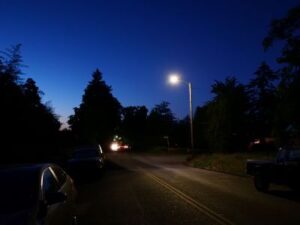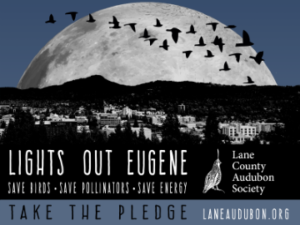Dim the Lights for Birds at Night!
 Artificial light at night has been shown to be deadly to birds and insect pollinators, and to deleteriously impact human health. Every spring and fall, millions of birds migrate through Oregon at night. Light pollution is known to disorient birds, causing death by exhaustion and building collisions. Our Lights Out Eugene campaign will help make a difference.
Artificial light at night has been shown to be deadly to birds and insect pollinators, and to deleteriously impact human health. Every spring and fall, millions of birds migrate through Oregon at night. Light pollution is known to disorient birds, causing death by exhaustion and building collisions. Our Lights Out Eugene campaign will help make a difference.
Sign the Lights Out Pledge
 North America’s bird population has declined 30 percent since the 1970’s. An estimated one billion birds die from building collisions annually, often lured by light pollution. Approximately 80 percent of our flowers and 40 percent of our crops are pollinated by native insects, one third of which are threatened with extinction. Artificial light at night is one major cause of this decline. In addition, light pollution has been found to increase the risk of diabetes, depression, and breast cancer in people.
North America’s bird population has declined 30 percent since the 1970’s. An estimated one billion birds die from building collisions annually, often lured by light pollution. Approximately 80 percent of our flowers and 40 percent of our crops are pollinated by native insects, one third of which are threatened with extinction. Artificial light at night is one major cause of this decline. In addition, light pollution has been found to increase the risk of diabetes, depression, and breast cancer in people.
There are many reasons to darken our night skies, and many cities around the world have found a solution. Begun by the Audubon Society 20 years ago, and found to be successful in reducing light pollution, Lights Out programs protect birds and pollinators, other wildlife, and people. They save energy and money and reduce our carbon footprint.
Many people share a concern about light pollution and want to help the natural world. We often feel helpless in the face of so much negative environmental news but Lights Out advances simple steps we can all take as we come together as a community to make a difference.
We encourage community members to reduce or eliminate the use of external, decorative, and unnecessary lighting throughout the year, and to take actions to further reduce light spill each night of the critical migration periods, September through October and April through June, between the hours of 10 pm and 6 am, to help ensure safe passage for migratory birds.
Here are the main components:
–Turn unnecessary lights off at night
–Install motion sensor lighting for security
–Close curtains, shades, and blinds to reduce light spill
–Use shielded lighting that directs lights downward
–Switch to less “blue light” and more “warm” (under 3000 Kelvin) wavelengths.
FOR FURTHER INFORMATION:
Resources about Lights Out: Learn about other Lights Out Programs, and more information about the problems and solutions.
-
National Audubon Lights Out
-
Lights Out Portland
-
Dark Sky Oregon
-
Dark Sky International
-
Smithsonian: Why Experts Agree on Lights Out
-
Dark Sky Approved Lighting
-
Artificial light at night: a pervasive problem. What you can do.
Resources on Bird Migration and protecting migrating birds
-
New Resources for Tracking Bird Migration –LCAS President’s Page
-
Bird Migration Questions and Some Answers–LCAS Conservation Column:
-
Bird Migration Forecast
-
See abundance maps change as birds migrate
Resources on the effects of light pollution on pollinators and other beneficial insects
-
Xerces Society To Protect Moths–Turn Out Lights
-
Chasing Bugs–Flip the Switch
-
Most recent study on insects (2023) “Dim light pollution prevents diapause induction in urban and rural moths” which means that their way of surviving the winter is extremely compromised
-
2020 review: “Light pollution is a driver of insect declines”
Resources on the effects of light pollution on human health
-
“Understanding light pollution: Recent advances on its health threats and regulations”
-
“Missing the Dark: Health Effects of Light Pollution”
Some Resources on Safety Concerns
-
“Overall, there was no evidence for an association between the aggregate count of crime and switch off or part-night lighting” Research article
-
“Is there a causal relationship between nighttime lighting and crime? None of the papers reviewed presents sufficient evidence to demonstrate a causal link between night-time lighting and crime.”[
-
“Outdoor lighting at night doesn’t do what you think it does to reduce crime and increase safety”
https://darksky.org/resources/what-is-light-pollution/effects/safety/#:~:text=There%20is%20no%20clear%20scientific,shown%20to%20make%20us%20safer.
Prevent Bird Collisions during daylight hours. Birds don’t see glass! Read about solutions to reduce deadly collisions with glass.
On September 15, 2023
Mayor Lucy Vinis, City of Eugene Oregon signed the

